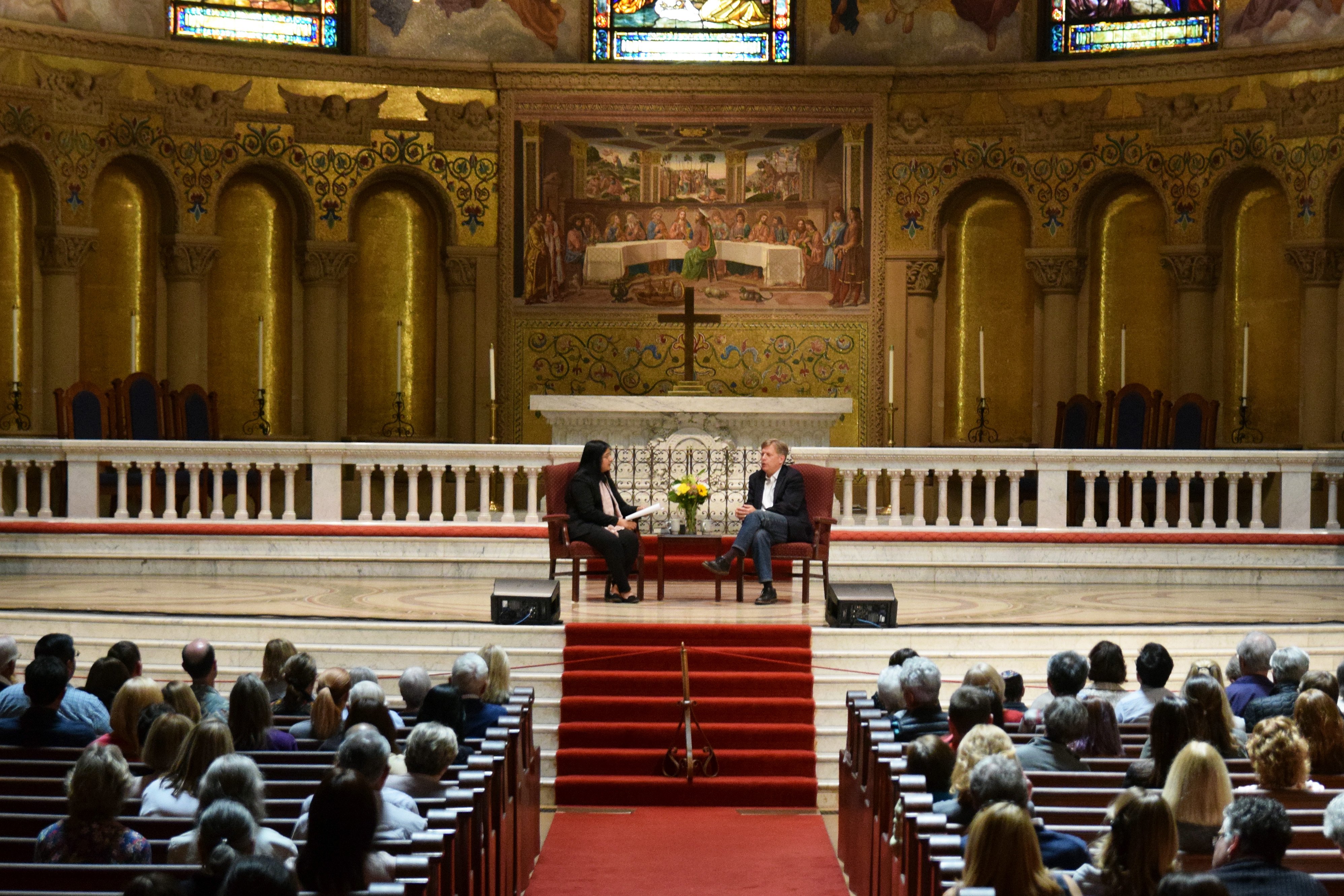Michael McFaul M.A. ’86, the current director of the Freeman Spogli Institute for International Studies (FSI), sat down on the Memorial Church stage across from Office for Religious Life Associate Dean Sughra Ahmed to speak about something he had “never talked about before.” For the next hour, the former ambassador to Russia with a resume that could fill pages spoke as a son, a husband, a dad and an avid Stanford cheerleader to students in the high-ceilinged sanctuary of Memorial Church.
It would be the first time since his own wedding that he found himself on that stage. As the last speaker for the 2019 “What Matters to Me and Why” series — meant to promote personal reflection and, in Ahmed’s words, discover the “person behind the name” — McFaul’s talk gave the audience what Ahmed describes as a gift: “the permission to be human too.”
Rather than focusing on Soviet and U.S. relations, something that as a former ambassador to Russia during the Obama administration McFaul certainly has expertise on, he talked about his personal life, values and career trajectory. During the course of this candid conversation with the audience, McFaul emphasized the importance of personal relationships.
To this end, McFaul made it clear early on that he values his family above all else.
“There is a big gap between them and everybody else,” he said. He openly acknowledged the opportunities his kids might have — like attending the Bolshoi Ballet during his stint in Moscow — that others might not.
In addition to speaking lovingly of his family, McFaul described the importance of personal relationships within his educational and career trajectory. McFaul refers to himself as an “accidental ambassador,” alluding to the role that his personal relationship with Susan Rice ’86 — who has served as National Security Advisor from 2013 to 2017 and U.S. Ambassador to the United Nations — had in his taking on positions in Washington, D.C. and later in Moscow. Rice, he said, described the Obama administration to him as a “train” he should catch before its departure.
McFaul describes himself as “blessed” and credits not only relationships but also Stanford for “everything.” If it had not been for Stanford and his time abroad in Leningrad, McFaul said, he would not have developed a relationship with Rice nor garnered the same level of expertise. Even apart from his ambassadorship, McFaul has held an impressive repertoire of positions, including Special Assistant to the President and Russian and Eurasian affairs senior director at the National Security Council.
McFaul, a native of Glasgow, Montana, said that before Stanford, he never would have imagined holding such prestigious positions in Washington and abroad. He traces his career trajectory and academic interests to his childhood and a change of high schools. McFaul was the oldest of five children, interested in a sports career, and resentful of what we viewed as his father’s financially unstable decisions to work as a folk musician.
Faced with an English requirement at his new high school, he chose to take a debate class. While the class did not immediately do him much quantifiable good — McFaul scored a 520 on the English portion of the SAT — it set him on a trajectory to study Soviet-U.S. trade policy.
McFaul emphasizes the underrated impact that teachers can have on a person’s life. If it were not for his debate teacher, who convinced him to join the team, McFaul said he might never have discovered how satisfying it is to do something with his brains instead of his legs — referencing his prior sports ambitions.
Maybe it is McFaul’s gratitude for this teacher that has led him to serve as the director of FSI. McFaul admits that it is hard to balance academia and policy but that he is grateful for the tenure that allows him to freedom to do both. One freedom that McFaul has as a tenured professor is taking knowledge outside of Stanford.
“We talk a little bit too much to ourselves,” McFaul said.
After a promotional tour for his book “From Cold War to Hot Peace” sent to him places like Tulsa, Okla. and Bozeman, Mont. McFaul realizes more than ever that we need to get out of our bubble at Stanford to talk about issues.
“There is a giant demand for that and we can’t think that others don’t want it,” he said referring to the academic rhetoric and issues talked about within intellectual circles.
When asked at the end what advice he would want his children to live by, McFaul again emphasizes relationships but adds that for his kids and any of his advisees he can only hope that they take jobs to do something rather than to be something.
“For my kids, I just would hope that they live their lives as action verbs and not in their own self-interest either,” he said.
This article has been corrected to reflect that Sughra Ahmed is an associate dean at the Office for Religious Life. The Daily regrets this error.
Contact Faith Koh at faithkoh ‘at’ stanford.edu.
